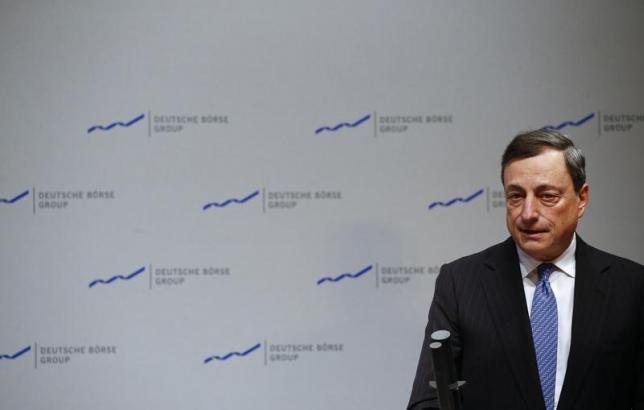Rebuffing critics, ECB chief promises to increase inflation

FRANKFURT - European Central Bank President Mario Draghi promised to increase inflation, rejecting criticism of the ECB's loose monetary policy and arguing that sluggish growth in prices was damaging the euro zone economy.
Speaking to an audience in Germany, on of the countries most sceptical of ECB policy, Draghi said the bank's 1.5 trillion euros of asset purchases were doing their intended job, and letting prices fall would lead to higher debt and unemployment.
The ECB's mandate is to keep inflation - now hovering near zero and expected to turn negative in coming months - just under 2 percent a year. After the bank met last week, Draghi said it would review and possibly adjust its policies in March, which investors took as a signal it would ease policy further.
"Meeting our objective is about credibility," Draghi told a business forum. "If a central bank sets an objective, it can't just move the goalposts when it misses it. Confidence comes from every party fulfilling its mandate. And that's what the ECB will do."
Markets now price in a 10-basis-point cut in the ECB's -0.3 percent deposit rate in March, and many investors also expect an increase in the bank's monthly asset purchases.
In December, the bank cut its deposit rate and extended its asset purchases. But the Governing Council's two German members both voted against the moves, and Bundesbank President Jens Weidmann repeatedly argued that low energy prices, the main force behind the low inflation, benefit the consumer and growth.
Draghi said that if the euro zone's inflation undershot the bank's baseline forecasts by 1 percentage point per year for five years, it would increase the private debt of households and companies by around 700 billion euros.
Draghi also played down criticism, expressed by many in Germany, that rock-bottom interest rates would lead to asset bubbles in housing and elsewhere.
"There are no warning signs of serious financial instability," Draghi said. "Financial crises are typically associated with strong credit growth and rising leverage in the banking system. What we see at the moment, however, is a nascent credit recovery and de-leveraging among banks."
Low interest rates, supported by ECB benchmark rates near or below zero, boost consumption, Draghi said. -Reuters







